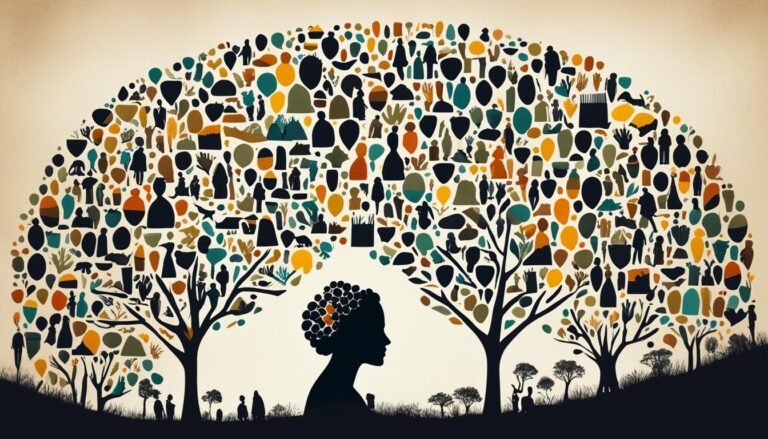Why is African Psychology Important?
African psychology is an increasingly significant field of study that explores how people of African descent perceive and experience the world. It challenges the dominant Western concepts of psychology and embraces the cultural context and diversity of African peoples. By recognizing the need to include African perspectives and values, African psychology aims to decolonize the discipline and foster a more inclusive and accurate understanding of mental health and identity formation in African individuals and communities.
Key Takeaways:
- African psychology focuses on the experiences and understanding of individuals of African descent.
- It challenges Western concepts and promotes a more inclusive approach to mental health.
- African psychology seeks to decolonize the discipline and incorporate African perspectives.
- It recognizes the importance of cultural context and diversity in understanding human behavior.
- African psychology contributes to the promotion of equity and cultural relevance in mental health practices.
The Impact of African Psychology on the Discipline
African psychology has made a profound impact on the discipline of psychology by challenging prevailing Eurocentric beliefs and paradigms. Through extensive research into African identity and psychology, African psychologists have shed light on the unique experiences and challenges faced by individuals of African descent. By decolonizing psychology and incorporating African perspectives, the field has contributed to a more comprehensive and inclusive understanding of human behavior.
The emergence of African psychology has disrupted the traditional Western concepts of psychology, which often overlooked the rich cultural context and diversity of African peoples. By acknowledging and valuing the African perspective, this field has helped to dismantle stereotypes and biases that have perpetuated negative portrayals of Black behavior and culture.
African psychology research has deepened our understanding of African identity and the psychological challenges faced by individuals within this group. It has explored the impact of historical trauma, systemic racism, and cultural influences on mental health and well-being. This research has highlighted the resilience, strength, and diverse experiences of African individuals and communities, challenging the notion of a monolithic Black identity.
“African psychology aims to decolonize psychology and promote a more inclusive and accurate understanding of African individuals and communities.”
By incorporating African perspectives, African psychology has also contributed to the development of culturally relevant therapeutic approaches. It has offered insights into Afrocentric models of research, therapy, and well-being, emphasizing the importance of cultural competence in providing effective mental health care.
| Contributions of African Psychology to the Discipline | Applications of African Psychology |
|---|---|
|
|
The Roots and Evolution of African Psychology
African psychology has deep historical roots, with its origins dating back to ancient African civilizations. One of the earliest examples of psychological understanding can be found in ancient Egypt, where concepts like Ma’at and the understanding of the psyche were developed. These ancient civilizations recognized the importance of the mind and its connection to human behavior.
Fast forward to modern times, where Black psychologists have played a pivotal role in establishing African psychology as a distinct field within the discipline. Prominent pioneers such as Joseph White and Wade Nobles challenged the Eurocentric assumptions of traditional psychology and paved the way for an authentic, non-deficit-based psychology for Black people.
“The discipline has to be broad and durable enough to use all that indigenous knowledge that we have as African people and to translate it into the Western intellectual paradigm so that we can communicate with other scholars around the world. The ultimate challenge is the one of humanity, to integrate this newfound knowledge into a global pursuit of collective welfare, health, and sanity.” – Professor Wade Nobles
The work of these pioneers was crucial in dismantling the prevailing biases and stereotypes that perpetuated the marginalization of African individuals and communities. By embracing African philosophies and heritage, African psychology has evolved into a discipline that acknowledges the unique experiences and needs of people of African descent.
African psychology pioneers have paved the way for a more inclusive and culturally relevant approach to understanding human behavior. Their contributions have helped reshape the field by highlighting the importance of cultural context and equity in psychological research, theory, and practice.
The Legacy of African Psychology Pioneers
Joseph White, also known as “the father of Black psychology,” dedicated his career to challenging the notion of racial inferiority and advocating for the inclusion of African perspectives in psychological research. He co-founded the Association of Black Psychologists and promoted the importance of culturally relevant therapy and counseling.
Wade Nobles, an esteemed psychologist and scholar, has been instrumental in developing Afrocentric models of therapy and research. He has emphasized the need to challenge Western frameworks and incorporate African cultural values and traditions into psychological practices. Nobles’ work has been influential in fostering a sense of pride and healing within Black communities.
These African psychology pioneers have left a lasting impact on the field, inspiring future generations of psychologists to continue the work of decolonizing psychology and promoting a more inclusive, equitable, and culturally sensitive understanding of human psychology.

Contributions and Applications of African Psychology
African psychology has made significant contributions to the development of Afrocentric models of research, therapy, and overall well-being. These contributions emphasize the importance of cultural relevance and understanding in mental health practices, offering a unique and empowering approach to psychological support for individuals of African descent.
A key aspect of the contributions of African psychology is its identification and addressal of the inaccuracies present in current psychological frameworks. These frameworks often overlook the distinct experiences and specific needs of African and African-American individuals. By shedding light on these disparities, African psychology helps bridge the gap and fosters equity in the field of psychology.
One of the areas where African psychology has made notable contributions is in the realm of therapy. It has developed Afrocentric therapeutic approaches that acknowledge the cultural, historical, and social contexts in which African individuals and communities navigate their mental health challenges. These approaches provide a more inclusive and relevant lens through which therapy can be tailored to meet the needs of diverse client populations.
“Afrocentric therapy serves as a powerful tool for healing, allowing individuals to connect with their African heritage and draw strength from it.” – Dr. Kwame Sarpong, African Psychology Expert
African psychology has also played a crucial role in advocating for increased equity and appreciation of Black excellence in the field of psychology. By challenging the predominantly Eurocentric perspectives that have historically dominated the discipline, African psychology strives to amplify the voices, experiences, and achievements of African researchers, practitioners, and scholars.
Through its multifaceted contributions, African psychology promotes a more inclusive and accurate understanding of mental health and well-being, ensuring that all individuals, regardless of their cultural background, have access to culturally relevant and empowering psychological support.
| Contributions of African Psychology | Applications in the Field |
|---|---|
| Development of Afrocentric models of research | Enhanced understanding of African mental health |
| Acknowledgment of cultural relevance in therapy | Inclusive therapeutic approaches |
| Addressal of inaccuracies in psychological frameworks | Promotion of equity in psychology |
| Amplification of African voices and achievements | Recognition of Black excellence in the field |
By embracing Afrocentric models, African psychology challenges the status quo and encourages the cultivation of diverse perspectives in psychological research and practice. It fosters a greater appreciation for the unique experiences and needs of African and African-American individuals, contributing to a more equitable and culturally responsive approach to psychology.
Conclusion
In conclusion, African psychology plays a crucial role in the field of psychology by recognizing the importance of cultural context and diversity. By challenging the historically dominant Eurocentric perspectives, African psychology promotes a more inclusive and accurate understanding of African individuals and communities. It acknowledges the unique experiences and challenges faced by individuals of African descent, contributing to the decolonization of psychology and the establishment of equity and cultural relevance in mental health practices.
Through embracing African philosophies and heritage, African psychology provides a platform for exploring the rich history and traditions of African civilizations. This inclusive approach allows for a comprehensive understanding of human behavior, mental health, and identity formation. By incorporating diverse perspectives and challenging prevailing assumptions, African psychology continues to make important contributions to the discipline, enhancing its scope and applicability.
Within the evolving landscape of psychology, African psychology serves as an important reminder of the need to go beyond traditional, Eurocentric models. It highlights the significance of cultural diversity and challenges the limitations imposed by narrow perspectives. African psychology paves the way for a more inclusive and accurate understanding of human psychology, enabling mental health practitioners to better serve diverse populations and foster a more equitable and culturally sensitive approach to psychological well-being.
FAQ
Why is African psychology important?
African psychology is important because it challenges traditional Western concepts of psychology and embraces the cultural context and diversity of African peoples. It recognizes the need to include African perspectives and values in mental health and identity formation research and practices.
What impact has African psychology had on the discipline?
African psychology has challenged the prevailing beliefs and paradigms about Black behavior and culture perpetuated by Eurocentric approaches. It has shed light on the unique experiences and challenges faced by individuals of African descent and contributed to a more comprehensive and inclusive understanding of human behavior.
What are the roots and evolution of African psychology?
African psychology can trace its roots back to ancient African civilizations, such as Ancient Egypt, where concepts like Ma’at and the understanding of the psyche were developed. In modern times, Black psychologists like Joseph White and Wade Nobles have played a crucial role in establishing African psychology as a distinct field within the discipline.
What are the contributions and applications of African psychology?
African psychology has contributed to the development of Afrocentric models of research, therapy, and well-being. It emphasizes the importance of cultural relevance and understanding in mental health practices and advocates for increased equity and appreciation of Black excellence in the field of psychology.
Is there a conclusion on the importance of African psychology?
African psychology is of great importance in the field of psychology. It recognizes the significance of cultural context and diversity in understanding human behavior and mental health. By embracing African philosophies and heritage, African psychology contributes to the decolonization of psychology and promotes equity and cultural relevance in mental health practices.






